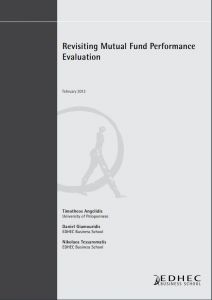

Revisiting Mutual Fund Performance Evaluation
Mutual fund manager excess performance should be measured relative to their self-reported benchmark rather than the return of a passive portfolio with the same risk characteristics. Ignoring the self-reported benchmark results in different measurement of stock selection and timing components of excess performance. This paper revisits baseline empirical evidence in mutual fund performance evaluation utilising stock selection and timing measures that incorporate the self-reported benchmark.
Author(s):
Summary:
Mutual fund manager excess performance should be measured relative to their self-reported benchmark rather than the return of a passive portfolio with the same risk characteristics. Ignoring the self-reported benchmark results in different measurement of stock selection and timing components of excess performance. This paper revisits baseline empirical evidence in mutual fund performance evaluation utilising stock selection and timing measures that incorporate the self-reported benchmark.
Register to download PDF
Register/Log in| Type : | Working paper |
|---|---|
| Date : | 02/06/2012 |
| Keywords : |
Performance |

